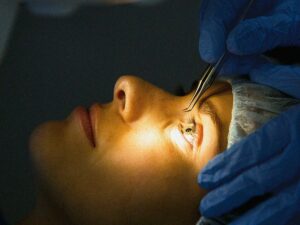If you are unhappy with your vision, you may be considering corrective refractive surgery. This is a great option for many people, but it is important to do your research before making a decision. In this blog post, we will discuss the different types of refractive surgery available and how to choose the right one for you. We will also talk about the benefits and risks of corrective surgery and what to expect after the procedure.
Contents
What Does Correct Refractive Surgery Mean?
 Corrective surgery is performed to improve the focusing power of your eye. It can be used to treat a number of different vision problems, including:
Corrective surgery is performed to improve the focusing power of your eye. It can be used to treat a number of different vision problems, including:
- Nearsightedness (myopia)
- Farsightedness (hyperopia)
- Astigmatism
These problems are caused by a misshapen cornea — the clear, round dome at the front of your eye. In some cases, they can also be caused by a problem with the shape of your eye’s lens. The correct refractive surgery is described as a procedure that helps to cure or greatly improve these vision problems.
It is believed that more than 90% of people who have had the surgery experience significant improvements in their vision. In fact, many people report that their vision is better than it was before they ever developed a vision problem. So if you’re considering corrective surgery, there’s a good chance that it will be successful in improving your vision.
What Are Types Of Refractive Surgery?
The correct refractive surgery is needed to fix common vision problems. There are several types of surgeries that can be done to improve your vision. Some of these include:
- LASIK surgery: This is a type of refractive surgery that uses lasers to correct vision. It is a popular choice for many people because it is effective and has a short recovery time. This surgery is usually done on an outpatient basis, which means that you will not have to stay in the hospital overnight.
- PRK surgery: This type of refractive surgery is similar to LASIK, but it uses a different type of laser. It is often used for people who are not good candidates for LASIK surgery. PRK surgery usually has a longer recovery time than LASIK, but it is still an effective way to improve your vision.
- Cataract surgery: This type of surgery is done to remove cataracts from your eyes. Cataracts can cause blurry vision and make it difficult to see. Cataract surgery is usually done on an outpatient basis, which means that you will not have to stay in the hospital overnight.
These three types of surgery are the most common types of refractive surgery. They are all effective ways to improve your vision and correct common vision problems.
If you have a vision problem, talk to your doctor about whether or not refractive surgery is right for you. There are many different types of surgery, so it is important to find the one that is best for you.
What Happens During Correct Refractive Surgery?
There are different types of corrective surgery, but they all work by reshaping your cornea — or, in some cases, your lens — so that light entering your eye is properly focused on your retina.
The type of surgery you have depends on your refractive error. If you have myopia (nearsightedness), for example, your cornea is too curved, and light entering your eye focuses in front of your retina instead of directly on it.
In this case, corrective surgery involves flattening your cornea so that light can focus directly on your retina. This can be done with a laser or with Intacs, which are tiny plastic inserts that change the shape of your cornea from the inside out.
If you have hyperopia (farsightedness), your cornea is too flat, and light focuses behind your retina instead of directly on it. Corrective surgery in this case involves making your cornea curvier so that light can focus directly on your retina.
This can be done with a laser, or with phakic intraocular lenses (IOLs), which are implanted in front of your eye’s natural lens to help focus light on your retina. No matter what type of surgery you have, the goal is always to end up with light that focuses directly on your retina for clear vision.
What Are The Benefits?
 There are many benefits that come with getting the perfect vision. Some common benefits are:
There are many benefits that come with getting the perfect vision. Some common benefits are:
- You will be able to see clearly without the use of glasses or contact lenses.
- There is a decreased chance of developing cataracts later in life.
- It can improve your night vision.
- It can make it easier for you to participate in sports and other physical activities.
- There is a decreased risk of developing other eye problems, such as glaucoma.
These benefits can have a significant impact on your quality of life. If you are considering refractive surgery, be sure to consult with an experienced and qualified surgeon to ensure that you are a good candidate for the procedure.
More often, you will be able to see clearly and have a better vision overall. This is especially true if you had to wear glasses or contact lenses before the surgery. You will no longer have to worry about losing or breaking your glasses, and you will not have to deal with the hassle of contact lenses.
What Are The Risks And Complications?
Sometimes, people experience ghosting, which is when they see a faint image of the object they are looking at to the side. This typically goes away after about six months. Other risks and complications associated with refractive surgery include:
- Cataracts: It is possible to develop cataracts after surgery, though this is usually only seen in people over the age of 40.
- Glaucoma: This is a condition where the pressure inside the eye increases, which can damage the optic nerve. It is more common in people with a family history of glaucoma, but it can occur in anyone.
- Retinal detachment: This is when the retina becomes detached from the back of the eye. It can occur if there is a tear in the retina, which can happen as a result of surgery.
- Eye infections: As with any surgery, there is always a risk of infection. However, this is usually only seen in people who have had previous eye surgery or who have a weakened immune system.
- Dry eyes: This is a common side effect of surgery, but it usually goes away after a few months. In some cases, you may need to use artificial tears or other treatments to help with the dryness.
- Undercorrections: This is when your vision is not as good as it was before surgery. It can happen if the surgeon removes too little tissue from the eye.
- Overcorrections: This is when your vision is worse than it was before surgery. It can happen if the surgeon removes too much tissue from the eye.
These complications can occur with any type of refractive surgery, so it is important to discuss them with your doctor before you have the procedure. If you have any concerns, be sure to ask your doctor about them.
Which Is The Best Refractive Surgery To Correct Vision?
 This is a difficult question to answer. It depends on what your goals are for surgery and what your starting point is. There are many options available, and the best option for you may not be the best option for someone else.
This is a difficult question to answer. It depends on what your goals are for surgery and what your starting point is. There are many options available, and the best option for you may not be the best option for someone else.
There are various types of refractive surgery. The most common type is LASIK, which uses a laser to change the shape of your cornea. Other types include PRK, LASEK, and epi-LASIK. One of the best or most effective surgery to get your vision corrected is by consulting an ophthalmologist who can guide you based on your individual case.
The most important factor in choosing the best type of refractive surgery is finding a reputable surgeon who has experience performing the procedure you are interested in.
In addition, there are other factors that can affect the success of your surgery, such as the health of your cornea and your overall health. Be sure to discuss all of these factors with your surgeon before making a decision. Some tips to choose the right surgeon include:
- Asking your regular eye doctor for a referral
- Checking with your insurance company to see if the surgeon is in your network
- Researching the surgeon’s experience and credentials
- Reading reviews from previous patients
With these tips, you can choose the best type of surgery for you and be on your way to perfect vision. So do not wait any longer and book that appointment today!
Conclusion
To conclude, correct refractive surgery is a great way to improve your vision. It is important to consult with an experienced surgeon to ensure that you are a good candidate for the procedure and that you understand the risks involved. With proper care and follow-up, you can enjoy a clear vision for years to come.
For more information on how to get perfect vision with correct refractive surgery, please contact Eye Mantra. We would be happy to schedule a consultation for you. EyeMantra offers the most advanced eye surgery options including PRK, Femto Lasik, SMILE surgery, Standard lasik, and Contoura vision. If you have any questions on lasik surgery, lasik surgery cost and lasik procedure, call us at +91-9711116605 or email at [email protected].


